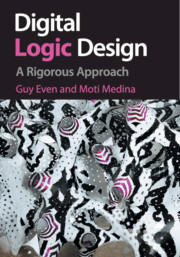Book contents
- Frontmatter
- Contents
- List of Algorithms
- Preface
- PART I PRELIMINARIES
- PART II COMBINATIONAL CIRCUITS
- 9 Representations of Boolean Functions by Formulas
- 10* The Digital Abstraction
- 11 Foundations of Combinational Circuits
- 12 Trees
- 13 Decoders and Encoders
- 14 Selectors and Shifters
- 15 Addition
- 16 Signed Addition
- PART III SYNCHRONOUS CIRCUITS
- PART IV A SIMPLIFIED DLX
- Bibliography
- Index
10* - The Digital Abstraction
from PART II - COMBINATIONAL CIRCUITS
Published online by Cambridge University Press: 05 November 2012
- Frontmatter
- Contents
- List of Algorithms
- Preface
- PART I PRELIMINARIES
- PART II COMBINATIONAL CIRCUITS
- 9 Representations of Boolean Functions by Formulas
- 10* The Digital Abstraction
- 11 Foundations of Combinational Circuits
- 12 Trees
- 13 Decoders and Encoders
- 14 Selectors and Shifters
- 15 Addition
- 16 Signed Addition
- PART III SYNCHRONOUS CIRCUITS
- PART IV A SIMPLIFIED DLX
- Bibliography
- Index
Summary
The term a digital circuit refers to a device that works in a binary world. In the binary world, the only values are zeros and ones. In other words, the inputs of a digital circuit are zeros and ones, and the outputs of a digital circuit are zeros and ones. Digital circuits are usually implemented by electronic devices and operate in the real world. In the real world, there are no zeros and ones; instead, what matters is the voltages of inputs and outputs. Since voltages refer to energy, they are continuous (unless quantum physics is used). So we have a gap between the continuous real world and the two-valued binary world. One should not regard this gap as absurd. Digital circuits are only an abstraction of electronic devices. In this chapter, we explain this abstraction, called the digital abstraction.
In the digital abstraction, one interprets voltage values as binary values. The advantages of the digital model cannot be overstated; this model enables one to focus on the digital behavior of a circuit, to ignore analog and transient phenomena, and to easily build larger, more complex circuits out of small circuits. The digital model together with a simple set of rules, called design rules, enable logic designers to design complex digital circuits consisting of millions of gates that operate as expected.
TRANSISTORS
The basic building blocks of digital electronic circuits are transistors. The hierarchy starts with transistors, from which gates are built.
- Type
- Chapter
- Information
- Digital Logic DesignA Rigorous Approach, pp. 133 - 144Publisher: Cambridge University PressPrint publication year: 2012

